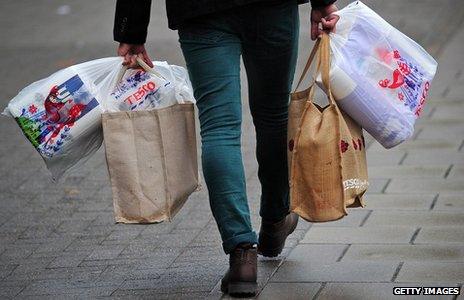Is Tesco on the turn?
- Published
- comments

Depending on how you measure it, Justin King has probably avoided the minor embarrassment of winning two accolades from his boss rivals (the chief executive they admire most) and simultaneously being obliged to announce the end of growth.
In the third quarter of its year, Sainsbury's underlying, or like-for-like, sales grew a tiny bit, 0.2%, excluding fuel, and were flat as a pancake including fuel. This compares with rises of 2.1% and 2% respectively in the strong second quarter of the year.
Is that a bump in the road after an extraordinary 35 quarters of unbroken growth? Yes, but not one such that King is likely to feel desperately uncomfortable.
More interesting is the piece of the jigsaw Sainsbury's provides to explain what happened to retailers and to household consumption in the Christmas period.
As I said on Monday, October and much of November were difficult months for the high street. But the Christmas period itself was strong, with King saying the seven days prior to 25 December were the busiest ever for the business.
The other important trends for all retailers were these:
Sales of more expensive items - cars, televisions, tablets and so on - were strong. At Sainsbury's, there was a 25% jump in tableware and 30% in "gifting".
2013 was the year in which online sales wagged the entire retailing dog, in a revolution that is permanent. The best performing store chains, Next, John Lewis and House of Fraser, are those with huge and efficient online presences. And at Sainsbury's, online grocery sales rose more than 10%.
The confidence of shoppers that online purchases will arrive in a timely way is shown by 22 December being Sainsbury's biggest-ever day for internet sales. In previous years, digital sales had tapered off so close to Christmas.
So what about Tesco, Sainsbury's much bigger rival, which reports tomorrow?
My hunch is that this Christmas will have been good for Tesco, in the sense of how its owners see the course and strategy set by the chief executive Philip Clarke.
This is not to say that the headline numbers will look great. There is bound to have been a fall in like-for-like, or underlying, sales, and so the simple direct comparison with Sainsbury's will not flatter Tesco.
But that disguises Tesco's strengths - especially in online - which Clarke is reinforcing.
Clarke has made a big and expensive bet that the future will be digital, and not about huge out-of-town stores.
The fruits of that are not yet conspicuous, in that there is still a big drag on sales from the way Clarke has permanently rebalanced sales away from less intrinsically profitable general merchandise towards food in the big stores and from the declining popularity of vast superstores.
But internet sales are growing at a remarkable rate - analysts believe digital, from a much bigger starting point than at Sainsbury's, has grown at a double-digit rate and rather faster than Sainsbury's.
And over the course of a year, the share of digital in Tesco's sales is said to have jumped several percentage points from under 5% of sales. For a business of Tesco's size - with its 10% share of the entire retail market - that is quite something.
Clarke has been reinforcing Tesco's "multi-channel" approach with the almost 500,000 own-brand Hudl tablets it sold in just the past few months. He is thought to have plans to follow up with another tablet and a smart phone.
As a result of digital, especially the so-called click-and-collect, approach to sales, Tesco has unrivalled access to UK consumers. For example, the citizens of Stornoway and the Hebrides will shortly be able to order online and collect their groceries from a depot by the ferry port.
All of which is not to say that Tesco will suddenly find itself increasing its profits as it did in the Leahy and Maclaurin years. Those days are gone, probably forever - because Tesco's market share is now so enormous, and is at the limit of what consumers are likely to tolerate.
But after their initial doubts, Tesco's owners may start to feel more confident that Clarke is keeping the giant baby in the bathwater, rather than - as they feared - seeing it disappear down the plughole.